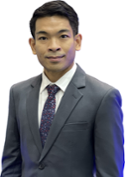Teerawat Wiwatpanit, PhD

Graduation Year: 2018
Advisor: García-Añoveros, Jaime
Current Position: Principal Investigator and Research Fellow, Medical Innovation Development and Assessment Support, Health Intervention and Technology Assessment Program, Ministry of Public Health, Thailand
Teerawat Wiwatpanit grew up in a city just north of Bangkok, Thailand. He moved to the States during his last year of high school and stayed here until after his PhD. He returned to Thailand in 2019, where he is currently Principal Investigator and Research Fellow at the Medical Innovation Development and Assessment Support, Health Intervention and Technology Assessment Program, Ministry of Public Health, Thailand.
Where did you do your undergraduate degree?
I did my undergraduate degree at Bowdoin College, Maine. I majored in Biology and minored in Visual Arts.
What made you want to go to graduate school?
I worked in a neurophysiology lab at Bowdoin, and I really liked the experience in the lab, especially the translational aspect of the work. I knew then that I wanted to pursue a career in the medical research field, and graduate school was the way to go about it.
What brought you to Northwestern and the DGP?
I had looked at several graduate programs and DGP at Northwestern stood out to me with all the multidisciplinary research options. I also wanted to move to a city setting like Chicago, so DGP was the perfect option.
What did you study in graduate school?
I was a graduate student in Dr Jaime García-Añoveros' lab, under Anesthesiology and Neurology Departments. Considering that we were under the neurology department, my dissertation was quite unique in that I was studying the functions of these lysosomal channels in the auditory, intestinal, and reproductive systems. I was also involved in projects on the development and degeneration of auditory hair cells. As I mentioned earlier, I do appreciate the multidisciplinary research opportunities at Northwestern.
What did you study in your postdoc?
After finishing my PhD, I joined Dr Julie Kim’s team in the Obstetrics and Gynecology department (Reproductive Science in Medicine). There, I started to dive into the biomedical engineering field. My project was on the development of endometrial organoids for disease modeling and drug testing. We were able to use the organoids to study the effect of PCOS on endometrial cancer risks. I was part of a large collaborative group at the Centre for Reproductive Science to develop a multi-organ chip to model the female reproductive tract and PCOS.
What are your current research and/or teaching interests? How have they changed over time?
I am currently a Principal Investigator and Research Fellow at the Medical Innovation Development and Assessment Support, Health Intervention and Technology Assessment Program, Ministry of Public Health, Thailand. My current research interests are early health technology assessment and health economics to promote efficient medical innovation development.
After my postdoc training, I moved back to Thailand to start a position at the National Center for Genetic Engineering and Biotechnology. My research focus was on biomedical engineering and infectious diseases, developing organoid platforms (endometrium and liver) for disease modeling and drug testing. As I became more involved in infectious disease research (malaria and Zika infection) and implementation research in low- and middle-income countries, my interest shifted to the relationship between medical innovation and healthcare policy. Now my work involves using multidisciplinary approaches to facilitate medical innovation development and implementation.
How did Northwestern prepare you for your current career?
My experience at Northwestern has taught me to integrate multiple aspects of medical and healthcare research efficiently. The basic and translational research from Northwestern gave me a unique perspective as a medical innovator to tackle issues in Thailand’s healthcare landscape.
What is the most rewarding part of your job?
As a medical researcher by training, I appreciate that now I work to help researchers develop medical and healthcare products that can compete in the market and get implemented in the healthcare system under the universal health benefits and social security programs.
What is the most challenging part of your job?
As my new interests have taken me to the policy side of the healthcare system, I have been learning a lot of new skills like health economics, science communication, and public engagement. This was challenging at first but the more I learn, the more exciting it becomes.
What advice would you give to current students interested in pursuing careers in academics?
There are multiple aspects to your research interests, so it is good to be flexible. I would suggest anyone interested in a career in academics form collaborations across multiple disciplines. On top of that, communication skills are quite important for you to convey your interests to others from funders to journal reviewers to the public.
Any final advice for students?
Your interests can always change. You don’t have to stress out about changing your career path because you can always learn new things. So, don’t be afraid to explore multiple interests and career options even though you are not familiar with them.